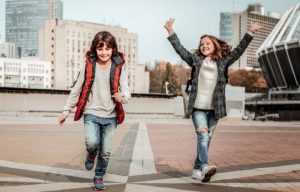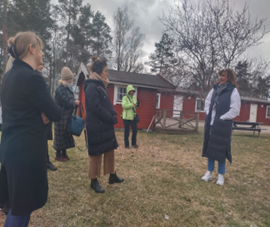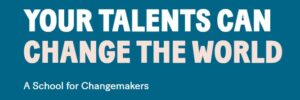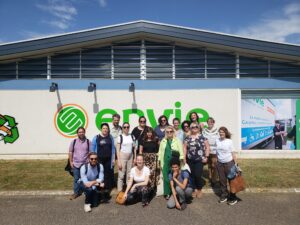The BuiCaSuS project aims to favour the development of social innovation by providing all countries with the tools to build a National Competence Centre for Social Innovation. To do so, Work Package 3 (WP3) specifically focuses on how to support the upscaling of social innovation projects contributing to more sustainable societies. After sharing their specific societal challenges, the members of the consortium decided to lay an emphasis on deinstitutionalization-oriented pilots. Therefore, ten pilot projects from Spain and Latvia will benefit from skills training and learning expeditions led by the French partner AVISE and Swedish partners Reach For Change and Inkludera in order to better equip them to support the upscaling of social innovation initiatives.
An action plan around the support of replication strategies
WP3 revolves around upscaling at the micro-level, meaning the “process by which one single social innovation tries to maximise its social impact by reinforcing its structuration and/or by leaning on its ecosystem” (Source: EC, 2021) and more specifically on the replication strategies.
Hence, to help the pilot projects upscale and replicate, the ten selected pilots will be represented by two social innovation (SI) actors: the SI implementor and the SI mentor.
- The SI implementor is involved at the technical level of the project and directly executes the pilot project’s actions.
- The SI mentor provides a more external view of the project. As a mentor, he/she gives advice on how to unfold the upscaling strategy. The mentor can be associated with the umbrella network the pilot project belongs to (Spanish cases) or he/she can be part of a support organization, for instance an incubator (Latvian cases).
The ten pilot-projects
From Spain:
My home: A life in community (Mi casa: una vida en comunidad)
Implementor: Probosco
Mentor: Plena Inclusion
Plena Inclusion aims at promoting public policies on the deinstitutionalization of people with intellectual disabilities in Spain.
Rights to housing: An opportunity to transform the Homelessness care system (Derechos a la Vivienda: el reto de la desinstitucionalización del sistema de atención al sinhogarismo)
Implementor: Provivienda
Mentor: HOGAR SÍ
The project seeks to transform the Spanish homelessness care system by providing affordable housing for homeless people.
Project Rumbo: Towards a model of connected and inclusive personal autonomy (Rumbo: hacia un modelo de autonomía personal conectada e inclusive)
Both implementor and mentor: COCEMFE
COCEMFE and their partners promote the autonomy of people with disabilities through physical and digital connectivity, as a way to help them reconnect with their community.
CRECE: Promoting people’s capacities, competencies and empowerment for the prevention of institutionalization and desinstitutionalization (CRECE: impulsando las capacidades, competencias y el empoderamiento de las personas para la prevención de la institucionalización y desinstitucionalización)
Both implementor and mentor: Cruz Roja Española/Spanish Red Cross
Executed by the Spanish Red Cross, CRECE stands against the institutionalization of the most vulnerable people.
Specialized Family Foster Care (AFE) (Acogimiento Familiar Especializado)
Implementor: FICE Federación Internacional de Comunidades Educativas Agintzari
Mentor: FICE Federación Internacional de Comunidades Educativas Spain
The AFE is an alternative foster care system preserving the right of every child to a family.
BIOCARES (Biocuidados)
Both implementor and mentor: Coceder
Biocares promotes intergenerational and crosscut relationships to prevent institutionalization by focusing on care services provided in the rural environment.
Como en casa
Implementor: Matia Fundazioa
Mentor: Matia Instituto
The Matia institute seeks the improvement of residential environments for the elderly.
Initiatives for the deinstitutionalization of youth in socio residential exclusion (Iniciativas para la desinstitucionalización de la juventud en exclusión socioresidencial)
Both implementor and mentor: Faciam
The project promotes residential alternatives for young people socially excluded due to gender, ethnic and migration discrimination in order to reinsert them into society.
From Latvia:
Social Skill Training Groups for Children and Young People with Autistic Spectrum Disorders (AST)
Implementor: Multifunctional Center “Step Up”
Mentor: Reach For Change Latvia
The project helps children with Autistic Spectrum Disorders to acquire skills to attend school, training and other social activities to be fully integrated in society.
Start the workforce
Implementor: Ligero
Mentor: Sonido
Start the workforce encourages the involvement of people at risk of social exclusion in the labour market by bringing job seekers and employers together.
Next step: learning expeditions in France and Sweden
After different preparatory meetings, the project holders are going to benefit from learning expeditions in France and Sweden to know more about the experience of local mature social innovation projects who went through an upscaling process.
After the Learning Expeditions which will happen in April and May 2022, some online collective sessions in June or July will gather the pilot projects around workshops on key issues related to their replication processes.
The focus on deinstitutionalization in Spain
Deinstitutionalization was chosen as a theme due to its considerable potential for social innovation. It refers to the necessary transition from institutional care settings to community-based alternatives. The eight pilot projects from Spain all promote the social inclusion of excluded groups who are transferred into specific institutions and alienated from the rest of the community. The main goal is to socially include everyone, living in the same space and in an independent and autonomous way.
Moreover, the concept implies a wide range of actions and possible beneficiaries: from the elderly to people with disabilities, from homeless people to foster children. The eight pilot-projects address different issues, varying from one specific type of beneficiary to another.






